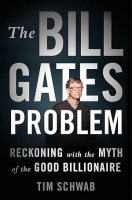Review

Title: The Bill Gates Problem: Reckoning with the Myth of the Good Billionaire
Author(s): Tim Schwab
The book touches many relevant points: Bill's personality, his past at Microsoft, his now ex-wife Melinda, the Gates Foundation, and quite a few big topics they have worked on: vaccines (including COVID-19), healthcare in poor countries, education (in the USA), farming/food, political influence
There are many mentions of Microsoft, where it seems his techniques related to employee management were based on too harsh challenging, embarrassment, and negative reinforcement. This is partially to raise the question of how somebody with that character "suddenly" becomes a gentle philanthropist (and if it really happened), and partially to question how the Gates Foundation negotiates, gives grants, and in general interacts with the world (suggesting that many of the "Microsoft ways" are applied at the Foundation).
The book depicts a Bill Gates that, instead of an innovator or inventor, it's a savvy businessman; one that employs philanthropy to do some good, but too focused on using big pharmaceutical companies and the private sector. More worryingly, someone in the book says that "Gates' biggest weakness is that he does not know what he does not know", he thinks he knows about everything, and coupled with his character, this means that he feels empowered to fix or improve everything. And when someone with so much wealth and power decides he's the one to solve the world problems, it is a dangerous path that should be closely watched.
Plus the unpleasant topic of the friendship Gates had with Jeffrey Epstein. Here I 100% agree with the book: One of the theoretically most clever individuals in the world, and doesn't even question if he should "visit" and do business with a convicted sex offender? After all the accusations? There's something really shady there.
Each of the chapters is around a single topic, and full of references, research, and interviews. To me, the issue with this format is that, when the topic itself can be summarized in a page or two, the author spends dozens of pages showcasing once, and again, and again, the same "why he, or the Gates Foundation, did/does XXX wrongly", and this becomes an exhausting and somewhat dull reading exercise. In a few cases, I began scanning for keywords in paragraphs to advance quicker, or else I would have stopped reading altogether. This is the big and main issue of the book: Too many detailed examples, instead of moving at minimum half of them to references at the end of the book, for those interested.
I like the idea of the book, of freely speaking against public figures by presenting facts, research, and questions (plus some guesses and hints). But the way of presenting all of it was not of my liking. Good to read, but with patience, and probably skipping paragraphs now and then.